Everyone in the poker world knows Gabe Kaplan as the announcer for High Stakes Poker. However, he is familiar to a wide audience in America, first of all, from the popular series of the 70s " Welcome back, Kotter ", where he played a major role and acted as a screenwriter, as well as from stand-up performances.
On YouTube, you can find videos from the 70s and recent performances.
Gabe did not have a long acting career. In the early 80s, he starred in a small TV series " Lewis and Clark ", and then limited himself to a few episodic roles. After that, he finally went to poker.
Gabe's Wikipedia page states that he has turned pro. This is probably still an exaggeration, but Kaplan really played for a long time and expensively, and even was a member of the famous "Big Hollywood Game".
It was this game that almost made Gabe a participant in a trial in 2011. The well-known fraudster and founder of the financial pyramid Brad Ruderman was accused of embezzlement in the amount of $44 million in May 2009. He disguised his criminal activities as a hedge fund – he collected money from clients and spent it on personal needs. In the list of things he did for entertainment, poker was at the top. In court, Ruderman admitted that he lost $5.2 million in a game with Hollywood stars, and according to the FBI, this total amount exceeded $20 million. In 2009, the judge sentenced Ruderman to 10 years in prison and damages in the amount of $27,585,849. In 2017, he was released ahead of schedule.
However, this was not enough for the unlucky investors, and they sued Tobey Maguire and other participants in the Great Game. In total, there were 22 names on the list, supposedly these were the most profitable players. This list includes director Nick Cassavetes and Gabe Kaplan, and others. However, the case did not reach the court, almost all the defendants agreed to pay compensation and rather modest ones. For example, Maguire gave $80,000 to the victims, while Kaplan got off with $26,900.
Thanks to poker in the 80s, Gabe met all the poker stars, many of whom he is still friendly with, which is clearly seen in the comments of High Stakes Poker. Most of all, he likes to play pranks on Doyle Brunson.
In one of the early seasons, the discussion around the table turned to the book Super/System, and Gabe told his story of his relationship with poker literature:
– The book cost $150, and I got it for free as a gift from Doyle himself. True, later it cost me several million.
In another episode, Doyle reminded Daniel Negreanu of a $35,000 longstanding debt.
“It seems that I also owe Doyle money for the 1948 presidential election,” Kaplan shared the secret. I hope he doesn't remember this.
The other day, Gabe tweeted an interview he took from Doyle and two other legends over 30 years ago:
“I hosted a sports radio show a long time ago,” Gabe wrote. Today I found a recording that poker players might like. This is a 1990 interview with Doyle [Brunson], Stu [Ungar], and Chip [Reese]. It's a little dated, but it's still fun to listen to all three of them together.
Did a sports radio show back in the day. Just discovered something that poker players should enjoy listening to. It's an interview from 1990 with Doyle, Stuey and Chip. A little dated in attitudes but still fun to hear the three of them together. https://t.co/B4QEtLQVcX
— Gabe Kaplan (@GabeKaplan) July 30, 2022
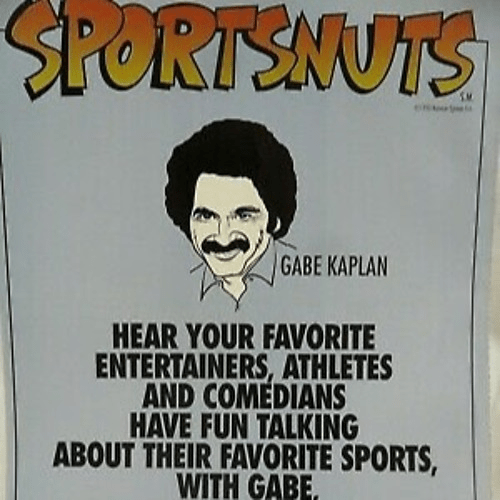
Gabe Kaplan: We have three of the greatest poker players here. Firstly, it is Chip Reese, who has been repeatedly recognized as the best universal player in the world. Also in the studio is Stu Ungar, a two-time WSOP Main Event winner, and the world's strongest gin rummy player. Some call him the best gin player of all time. He is also famous for his impeccable behavior at the table, having repeatedly won in the category "the friendliest player". And finally, Mr. Doyle Brunson, who won the main tournament twice in a row. He is a real legend, at least he considers himself so. If you want to ask a question to our guests, call the studio.
The remark about Ungar's friendliness caused a friendly laugh in the studio, since, on the contrary, he was famous for his creepy character and disgusting behavior at the poker table.
From the memoirs of Doyle Brunson:
– Despite the fact that Stu was my close friend, our relationship was constantly balancing between love and hate. I have never met a more arrogant and rude player in my life. I think he was the only one I almost hit at the poker table. Moreover, in terms of weight, I was three times his size, and I wanted to hit him far more than once. The way he behaved was simply unbearable. He threw cards at the dealers and cursed like a retired sailor. He could spit at the dealer who dealt the wrong card. Once at the Golden Nugget casino, he swore at the dealer girl so much that she called the manager, took off her badge and said: "I'm quitting." After that, she turned to Stu and added: "And you, you son of a bitch, I'm waiting at the exit." She was a large woman, and Stu wisely declined her offer.
During the last World Series, Ungar's daughter posted an archive photo of her father sitting between Gabe and Tom McAvoy.
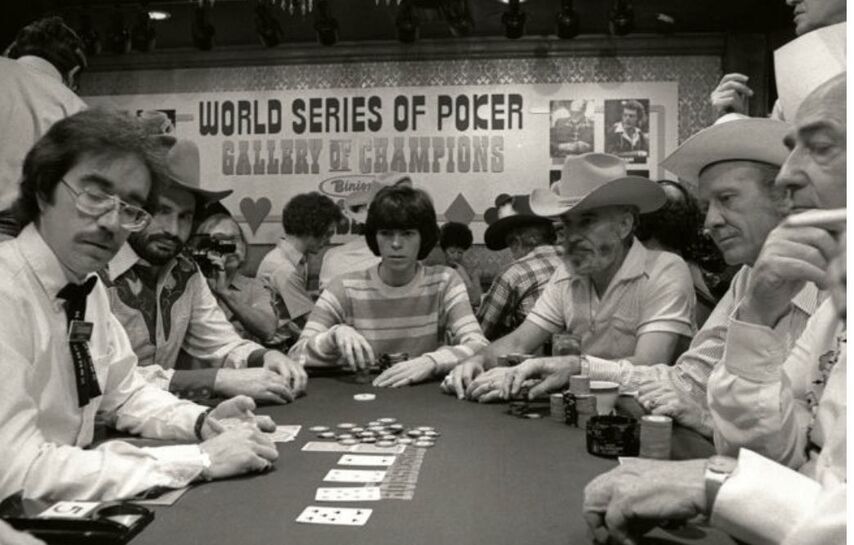
– Met with Tom and John (this is the dealer from that photo). They organized a meeting of dealers from the 70s and 80s, and they called me too. She admitted that I was very surprised, considering all the stories about Dad 😰 But they just laughed, said that over time he became wiser, and even made friends with many 🙌🏼💗
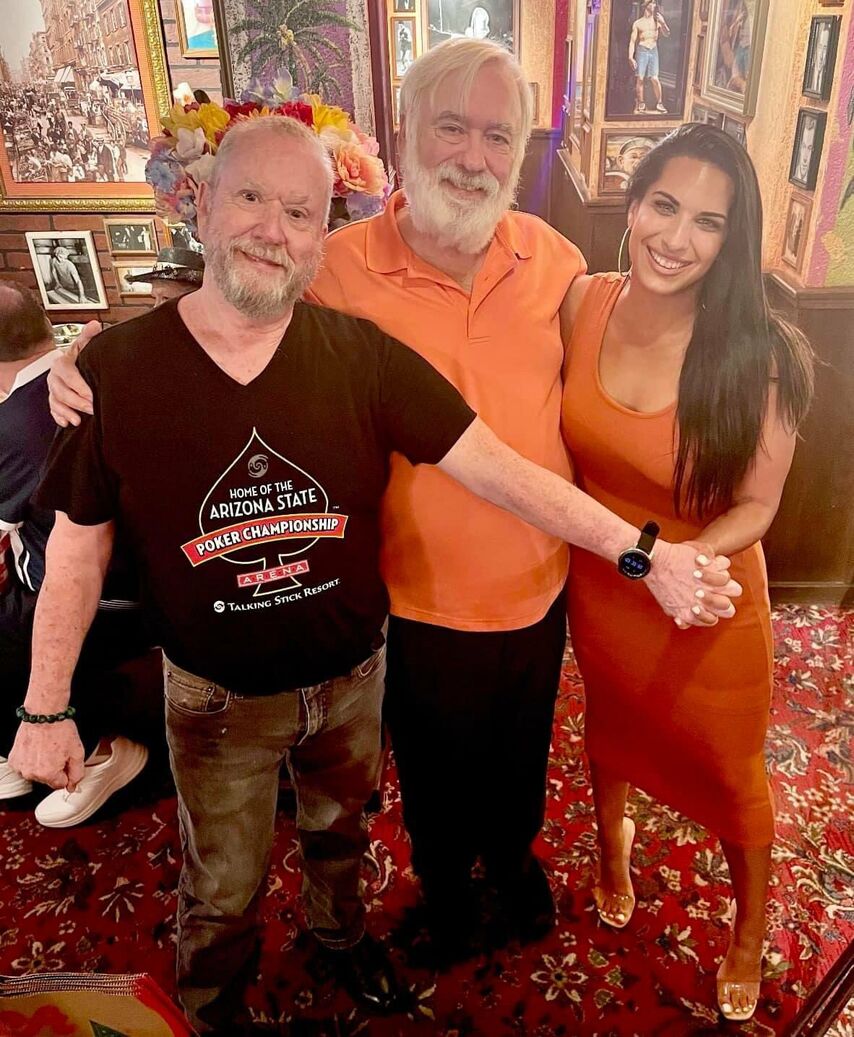
Gabe Kaplan: Chip, first question for you. You have been recognized as the best player in the world for several years in a row. How do you become a good poker player?
Chip Reese: I'm pretty sure it has nothing to do with education. As in business, here, first of all, you need to learn how to read people. We look at an opponent whom we see for the first time in our lives, and in a couple of seconds, we must understand whether he has something or not. And here it does not matter at all whether you graduated from Harvard or could not go to the third grade of school. Some people have instincts, and some just don't.
Gabe Kaplan: And this trio perfectly confirms this. All have completely different origins. Chip is an Ivy League graduate of Dartmouth College, Stu is a kid from the streets of New York, and Doyle is a typical Texan. Doyle, you could have been a professional basketball player, right? Were you invited to try out at the Lakers?
Doyle Brunson: Yes, the Lakers spoke to my college coach. But then I broke my leg, and I had to forget about basketball.
Gabe Kaplan: How did you start playing poker?
Doyle Brunson: When I said goodbye to a sports career, I began to look for where else there is a competitive spirit. And poker is not inferior to professional sports.
Gabe Kaplan: What role does luck play in poker?
Doyle Brunson: I think almost nothing in the long run. Anyone can win in a single session, but time puts everything in its place.
Gabe Kaplan: Stu, are the skills required to be successful at poker and gin very different?
Stu Ungar: In my case, there is no difference. I have some kind of gift, I just feel the cards.
Gabe Kaplan: Are you ready to play gin rummy with anyone?
Stu Ungar: Any person who can breathe.
Jennifer Shahade recently told a colorful story about Stu's reputation for gin.
--Highlight of my postlims so far: stories from legendary Berry Johnston in the HOF event. Here’s one: Berry was playing gin all night, lost a bunch to one guy.
Stu Ungar pulls Berry aside, explains how the villain was cheating, and offers a fair game.
“I’d rather play the cheater”
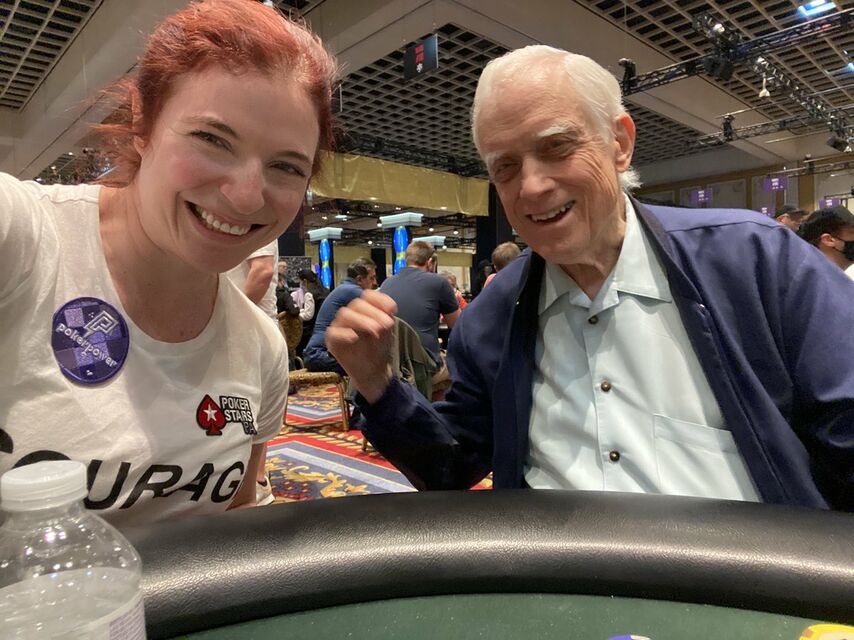
Gabe Kaplan: Interest in the World Series is growing every year. How many people played this year?
Stu Ungar: 194 in the main event.
Gabe Kaplan: How many was it when it all started?
Doyle Brunson: Six.
Gabe Kaplan: Not bad. Let's move on to questions from the audience. First question from Richard.
You are playing a game where you can only win with a set. But you got a full house or four of a kind, will you win or lose?
Gabe Kaplan: Okay, let them answer that question as well.
Chip Reese: Richard, if I understand correctly, you ask when you have three twos and two threes in your hand, are you better than, for example, three sixes? Your best combination is always taken into account, if it is higher than the set, then you won.
Doyle Brunson: I've never heard of the "only set win" game.
Gabe Kaplan: Me too. Maybe they invented it themselves and no one else plays it. The next question is from Michael.
“I wonder if you ever pulled a gutshot?”
Doyle Brunson: Haha, that happened to me quite often.
Stu Ungar: In 1980, I beat Doyle heads-up in the main event, and the final hand on the turn was his two-pair but I hit my gutshot.
Doyle raised preflop to 10,000 with , Stu Ungar called with . On the flop Doyle bet 18,000 and Ungar called. Turn , Stu bet 30,000 and Doyle shoved and got called quickly. River .
Gabe Kaplan: Why did you call on the flop?
Stu Ungar: I was planning on stealing the pot, I didn't think he had strong cards and just wanted to bluff Doyle.
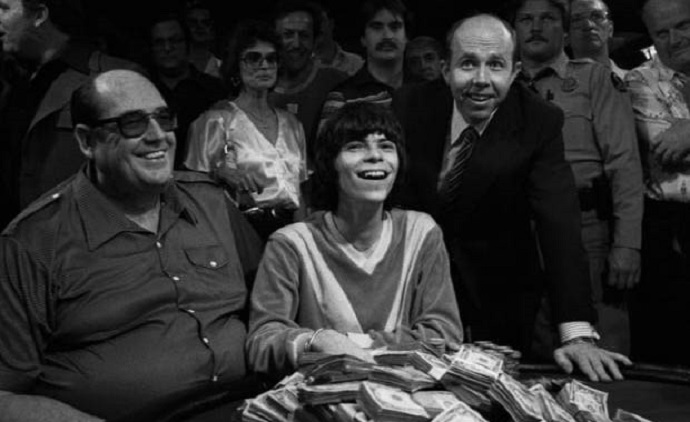
Gabe Kaplan: This hand won you the main event. But I want to remember another. You also played heads-up and both got . The flop had been opened , Doyle bet, Stewie shoved and got called. Stu opened , to which Doyle replied, "It's me who doesn't hit." The turn and river were opened, Stu had already begun to celebrate victory in the tournament, but Doyle opened his cards with the words: “I don’t hit, but I don’t lose either.” Haha.
Is playing in high-value tournaments very different from cash games?
Stu Ungar: Players understand that if they lose all their chips, they will not be able to return, so they play carefully.
Gabe Kaplan: Doyle, you won the main event twice in a row. Were you lucky, or were you really the strongest of all?
Doyle Brunson: The first time I won purely by luck, the second time I really felt like I was playing the best. In the entire tournament, I never even risked my entire stack. And in 1976, my opponent was very hard.
In the final hand, Doyle called preflop with against Jesse Alto. On the flop with two hearts and one spade, Alto with bet the pot, Doyle shoved and got called. Turn , river .
Gabe Kaplan: Lisa (Ed. – Gabe's co-host ), did you have something to ask?
Lisa: Chip, we hear about "poker face" all the time. How important is this in reality?
Chip Reese: It's incredibly important when you're playing against the pros. We play with Doyle and Stu almost every day, they can smile in one hand, frown in another, and be angry in the third. And I need to figure out when they are pretending, and when they express real emotions. It is very important to be able to change your behavior so that you can not be read.
Gabe Kaplan: How big is the difference between limit and no-limit poker?
Chip Reese: Huge, like between a 100m and a kilometer run.
Stu Ungar: The price of a mistake is not that high in limit games. In NL, one mistake can cost your entire stack. In my opinion, this is the main difference.
Doyle Brunson: No-limit poker requires a lot more discipline.
Gabe Kaplan: Is it true that NL requires total dedication?
Doyle Brunson: It is, which is why most players fail at high stakes.
Chip Reese: There is very little bluffing in Limit, it's a measured math game where we play good cards at a certain frequency. Psychology is much more important in NL, if we consider the opponent weak, we feel when he has nothing, we ourselves do not have to have a strong hand.
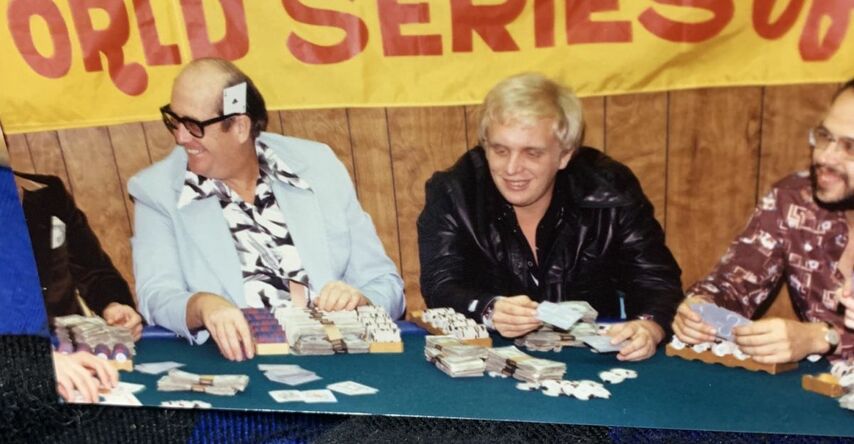
Gabe Kaplan: Poker is not an easy profession, especially for the players' partners. Doyle, how long have you been married?
Doyle Brunson: 30 years old.
Gabe Kaplan: Your wife doesn't play cards?
Doyle Brunson: She can't tell a king from an ace, no kidding. I am sure that only a unique woman can live so many years next to a poker player. I keep asking myself, “What did I do to deserve this? Why is she still with me? I can not appear at home for months, but I did not see even a hint of discontent from her.
Lisa: And what is a professional player? How many tournaments do you play per year?
Doyle Brunson: A professional is, first of all, a person who earns money by playing. The number of tournaments is completely unimportant.
Lisa: But if you want, you can play 365 days a year?
Doyle Brunson: Of course, now there is no problem with this at all. Legal tournaments are held all over the world. We recently traveled to England, Australia, and Ireland. Poker is developing, you can play anywhere and every day the popularity of the game is only growing, especially in Europe.
Chip Reese: This year the main tournament was won by a guy from Iran (ed. – Mansoor Matlubi ). A very strong player, but he came to Vegas for the first time. I'm sure when he gets home and tells that he got $800,000 on his first try, even more people will be interested in poker.
Gabe Kaplan: Chip, are you also married, or have been looking for a long time?
Chip Reese: That's right, I can only subscribe to Doyle's words, it's very difficult for us to find a life partner. Gabe, you yourself witnessed my search. We traveled the world as singles before I met my future wife, and you were there when I asked her out on our first date.
Gabe Kaplan: Yeah, I used to come down from Vegas a lot for weekends with the girls myself. But the relationship quickly ended because I played poker all day long. But on one of the trips, he decided that he had found his destiny. I met a girl right in the poker room. We started talking, I invited her on a date, she agreed, but at that moment they announced that the game was starting. She waved at me and ran to the table.
Chip Reese: Should have proposed to her right there.
Gabe Kaplan: I agree. Let's hear another call. Georgie, are you with us?
Yes, I have a question for Stu. If someone wants to play gin with you, how do you organize it?
Gabe Kaplan: If you're serious, we can give your number to Stu. But if I were you, I would refrain from doing so. Doyle, during the break you told a wonderful story about "Sailor" Roberts. Repeat it for our listeners.
Doyle Brunson: This is my buddy who was always surrounded by girls. Once he lost all his money in poker and called another lover: “Honey, I just lost everything. But do you still love me?" “Of course, honey,” she replied. “And I will miss you a lot.”
Lisa: The main tournament runs for four days. And I was very surprised that there are practically no breaks in it. How do you manage to stay focused?
Doyle Brunson: That's what distinguishes strong players, we can play at a high level for several days in a row. Thanks to discipline, we avoid mistakes that can cost the entire tournament.
Gabe Kaplan: We have two minutes left, I wanted to end with a serious question. All of you are profitable players and the best representatives of poker. What advice would you give to people who are struggling with gambling addiction?
Chip Reese: I would advise such people to seek help from specialists. Ludomania is one of the most dangerous addictions. You will not be able to win, you will gradually lose control over your own life and you will not get out of this hole on your own.
Gabe Kaplan: Stu, do you have anything to add?
Stu Ungar: I totally agree with Chip.
Doyle Brunson: I agree too. The last thing I want to know is that I won money from a rival who saved it for rent or food for the children.











